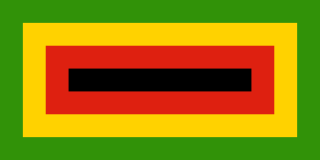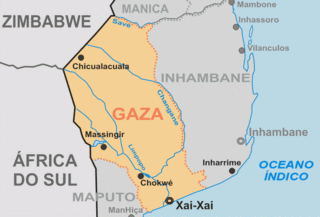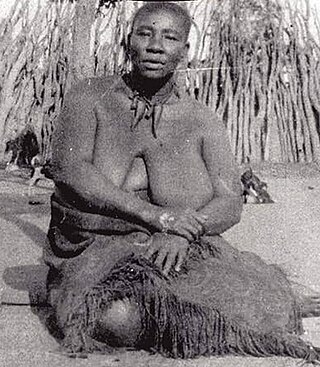Related Research Articles

The Zimbabwe African National Union (ZANU) was a militant socialist organisation that fought against white-minority rule in Rhodesia, formed as a split from the Zimbabwe African People's Union (ZAPU) in 1963. ZANU split in 1975 into wings loyal to Robert Mugabe and Ndabaningi Sithole, later respectively called ZANU–PF and ZANU–Ndonga. These two sub-divisions ran separately at the 1980 general election, where ZANU–PF has been in power ever since, and ZANU–Ndonga a minor opposition party.

Joshua Mqabuko Nyongolo Nkomo was a Zimbabwean revolutionary and politician who served as Vice-President of Zimbabwe from 1990 until his death in 1999. He founded and led the Zimbabwe African People's Union (ZAPU) from 1961 until it merged in 1987 with Robert Mugabe's Zimbabwe African National Union (ZANU) to form ZANU–PF after an internal military crackdown called Gukurahundi in western Zimbabwe, mostly on ethnic Ndebele ZAPU supporters.

Lobengula Khumalo was the second and last official king of the Northern Ndebele people. Both names in the Ndebele language mean "the men of the long shields", a reference to the Ndebele warriors' use of the Nguni shield.

Matabeleland is a region located in southwestern Zimbabwe that is divided into three provinces: Matabeleland North, Bulawayo, and Matabeleland South. These provinces are in the west and south-west of Zimbabwe, between the Limpopo and Zambezi rivers and are further separated from Midlands by the Shangani River in central Zimbabwe. The region is named after its inhabitants, the Ndebele people who were called "Amatabele"(people with long spears – Mzilikazi 's group of people who were escaping the Mfecani wars). Other ethnic groups who inhabit parts of Matabeleland include the Tonga, Bakalanga, Venda, Nambya, Khoisan, Xhosa, Sotho, Tswana, and Tsonga.
The Patriotic Front in Zimbabwe was a coalition of two African Leadership parties: the Zimbabwe African Peoples Union (ZAPU) and the Zimbabwe African National Union (ZANU) which had worked together to fight against white minority rule in Rhodesia.

Ngungunyane, also known as Mdungazwe Ngungunyane Nxumalo, N'gungunhana, or Gungunhana Reinaldo Frederico Gungunhana, was a tribal king and vassal of the Portuguese Empire, who rebelled, was defeated by General Joaquim Mouzinho de Albuquerque and lived out the rest of his life in exile, first in Lisbon, but later on the island of Terceira, in the Azores.
The Northern Ndebele people are a Nguni ethnic group native to Southern Africa. Significant populations of native speakers of the Northern Ndebele language (siNdebele) are found in Zimbabwe and in South Africa.

Zimbabwe African National Liberation Army (ZANLA) was the military wing of the Zimbabwe African National Union (ZANU), a militant African nationalist organisation that participated in the Rhodesian Bush War against white minority rule of Rhodesia.
Soshangana Ka Gasa Zikode, born Soshangana Nxumalo, was the Founder and the Monarch of the Gaza Empire, which at the height of its power stretched from the Limpopo river in southern Mozambique up to the Zambezi river in the north. Soshangana ruled over the Gaza state from 1825 until his death in 1858. Soshangana was also known by the name of Manukosi.
The Front for the Liberation of Zimbabwe (FROLIZI) was an African nationalist organisation established in opposition to the white minority government of Rhodesia. It was announced in Lusaka, Zambia in October 1971 as a merger of the two principal African nationalist factions in Rhodesia, the Zimbabwe African People's Union (ZAPU) and the Zimbabwe African National Union (ZANU). However, it was in fact a breakaway faction of both ZAPU and ZANU, established by members of both groups who had become disaffected due to their rival organisations' incessant internal and external disputes. Its domination by members of the Zezuru, a subgroup of the Shona people, led to accusations that it was merely a tribal grouping and ridicule as the "Front for the Liaison of Zezuru Intellectuals".

Highlanders FC is a Zimbabwean football club based in Bulawayo, Zimbabwe that plays in the Zimbabwe Premier Soccer League. It is also known colloquially as iBosso, Amahlolanyama.

The military history of Zimbabwe chronicles a vast time period and complex events from the dawn of history until the present time. It covers invasions of native peoples of Africa, encroachment by Europeans, and civil conflict.

The Gaza Empire (1824–1895) was an African empire established by general Soshangane and was located in southeastern Africa in the area of southern Mozambique and southeastern Zimbabwe. The Gaza Empire, at its height in the 1860s, covered all of Mozambique between the Zambezi and Limpopo rivers, known as Gazaland.
Europeans first came to the region in southern Africa today called Zimbabwe in the sixteenth century, when Portuguese colonials ventured inland from Mozambique and attacked the Kingdom of Mutapa, which then controlled an area roughly equivalent to eastern Zimbabwe and western Mozambique. Portuguese influence over Mutapa endured for about two centuries before fading away during the 1690s and early-1700s (decade). During the year of 1685, French Huguenots emigrated to present-day South Africa and whilst some settled there, others moved further north into the continent. Those who did, settled within modern-day Zimbabwe, Mozambique and Botswana, and co-existed with the indigenous people; most of whom, in Zimbabwe, were the Naletale people.
Ndlovu is a surname, common in South Africa and Zimbabwe, originating from the Nguni languages and prevalent among the Ndebele and Zulu people. Notable people with the surname include:
King Mzila Nxumalo, Mzila kaSoshangane Nxumalo, Umzila, Muzila, or Nyamende was the son of Soshangane kaZikode, the founder of the Gaza empire, which at the height of its power stretched from southern Mozambique to the Limpopo River. He defeated his brother Mawewe kaSoshangane in 1861 to ascend to the Gaza throne which he ruled from 1861 to 1885. He was father of King Ngungunyane Nxumalo Gungunhana|Ndungazwe who was deposed by the Portuguese invasion Portuguese Empire.

Mthwakazi is the traditional name of the proto-Ndebele people and Ndebele kingdom and is in the area of today's Zimbabwe. Mthwakazi is widely used to refer to inhabitants of Matebeleland Province in Zimbabwe.

Lozikeyi Dlodlo was a queen regent of the Ndebele people in Southern Africa.
The House of Khumalo is the reigning royal Family of the former Mthwakazi Kingdom. The Mthwakazi Kingdom was founded in 1823 by Mzilikazi kaMatshobana. While the Mthwakazi Kingdom ended in 1894 with the First Matabele War, The house has endured to the present day.
Hellenocentrism or Grecocentrism is a worldview centered on Greeks and Greek civilization. The worldview presupposes the idea that Greeks were somehow unique in world history and that Greek civilization essentially emerged from within itself. Nonetheless such premises have been frequently questioned.
References
- 1 2 Ndlovu-Gatsheni, Sabelo J. (2008-09-22). "Who ruled by the spear? Rethinking the form of governance in the Ndebele state". African Studies Quarterly. 10 (2–3): NA–NA.
- ↑ Kathleen E. Sheldon (2005). Historical Dictionary of Women in Sub-Saharan Africa. Scarecrow Press. ISBN 978-0-8108-5331-7.
- ↑ "2 Who Ruled by the Spear? Rethinking the Form of Governance in the Ndebele State SABELO J. NDLOVU-GATSHENI Abstract: The current intellectual stampede over". www.ab.i-pdf.info. Retrieved 21 September 2017.